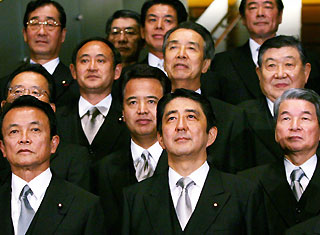|
Abe pledges to improve ties with China
(Xinhua)
Updated: 2006-09-29 14:24
Japan's newly-elected Prime Minister Shinzo Abe vowed Friday in his policy
speech to improve relations of trust with China, South Korea, calling them
"important neighbors."

Newly-elected Japanese
Prime Minister Shinzo Abe (C) poses with his Foreign Minister Taro Aso (L)
and other cabinet members during an official group photo at the premier's
official residence in Tokyo September 26, 2006.
[Reuters] |
"China and South Korea are
important neighbors, with which Japan has established unprecedentedly close
relations in economic and other areas," Abe said in his first policy address to
the parliament.
"It was extremely important, to Asia as well as to the
international society, to strengthen trust with China and South Korea," said
Japan's first premier born after World War II.
Japan has strained ties
with its Asian neighbors largely due to its prime minister's visits to the
war-linked Yasukuni Shrine, where top war criminals are honored.
"I think
it is important for all sides to make efforts so we can have forward-looking and
frank discussions," Abe added.
On Japan-U.S. alliance, Abe said that
Japan will strengthen its relations of trust with the United States, which is
the basis of their alliance. "The Cabinet will communicate with the White House
regularly to strengthen the ties," he said.
The 52-year-old premier, who
took office Tuesday, also pledged to advance steadily in implementing an agreed
plan to reorganize the U.S. military presence in Japan.
In the diplomacy
part of his speech, Abe also said that Japan will cooperate with the United
States in solving the Korean Peninsula nuclear issue within the six-party talks
frameworks.
The premier also touched on relations with Russia, the
Association of Southeast Asian Nations (ASEAN), India and Australia as well as
Iraq's reconstruction and Japan's aim to win a permanent seat in the United
Nations Security Council.
The premier aimed to build a powerful
premier's office. "I aim to reorganize and strengthen capabilities at the prime
minister's office, so that it will be the control tower with strong political
leadership and enable quick decision-making on national strategies regarding
diplomacy and national security," Abe said.
On domestic issues, the new
premier said he will place priority on rebuilding the state finances through
cutting fiscal expenditure before considering tax hikes. He also mentioned plans
to revitalize local economies and provide more economic opportunities for
disadvantaged people and minimize disparities.
Abe said he wanted to have
a legislation passed for revising Japan's pacifist Constitution. He also vowed
to reform education, which included such measures as improving public schooling,
requiring teachers to renew their licenses periodically to ensure
qualifications, and have schools evaluated by third parties.
|
| |
|
| |
|
|
|
| Most Commented/Read Stories in 48 Hours |
|
|
|
|